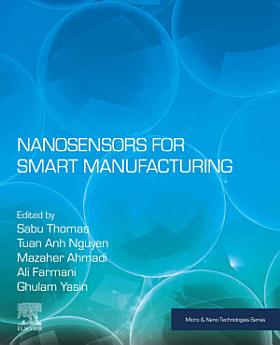Nanosensors for Smart Manufacturing
Informacje o e-booku
O autorze
Sabu Thomas is a Senior Professor of Mahatma Gandhi University, Kottayam, Kerala, India, and also Chairman of the TrEST Research Park, Trivandrum, India. He is known for his outstanding contributions in polymer science and nanotechnology.
Tuan Anh Nguyen is Senior Principal Research Scientist at the Institute for Tropical Technology, Vietnam Academy of Science and Technology, Vietnam. He received B.S. in Physics from Hanoi University in 1992, and Ph.D. in Chemistry from the Paris Diderot University (France) in 2003. He was Visiting Scientist at Seoul National University (South Korea, 2004) and University of Wollongong (Australia, 2005). He then worked as Postdoctoral Research Associate and Research Scientist in the Montana State University (USA), 2006-2009. In 2012, he was appointed as the Head of the Microanalysis Department at Institute for Tropical Technology. His research activities include smart sensors, smart networks, smart hospitals, smart cities and digital twins. He edited over 70 Elsevier, 12 CRC Press, 1 Springer, 1 RSC and 2 IGI Global books. He is Editor-In-Chief of "Kenkyu Journal of Nanotechnology & Nanoscience".
Dr. Mazaher Ahmadi received his Ph.D. in Analytical Chemistry from Bu-Ali Sina University in 2017. He has been to Alicante University, Spain, and Stockholm University, Sweden, as a visiting researcher in 2015-2016 and 2016-2017, respectively. He became an Assistant Professor of Analytical Chemistry at Bu-Ali Sina University in 2019. His professional experiences also include two post-doctorate research courses at Shiraz University of Medical Science, Iran, and Bu-Ali Sina University, Iran, in 2017-2018 and 2018-2019, respectively. Dr. Ahmadi is an expert in nanotechnology, analytical method development, pollutant removal, and wastewater treatment. He has edited six Elsevier books. He also has contributed eleven book chapters with Elsevier.
Dr. Ali Farmani is an Assistant Professor in the Department of Electrical Engineering at Lorestan University in Khorramabad, Iran. His research focuses on optical nanostructured materials.
Ghulam Yasin is a researcher in the School of Environment and Civil Engineering at Dongguan University of Technology, Guangdong, China. His expertise covers the design and development of hybrid devices and technologies of carbon nanostructures and advanced nanomaterials for for real-world impact in energy-related and other functional applications.





